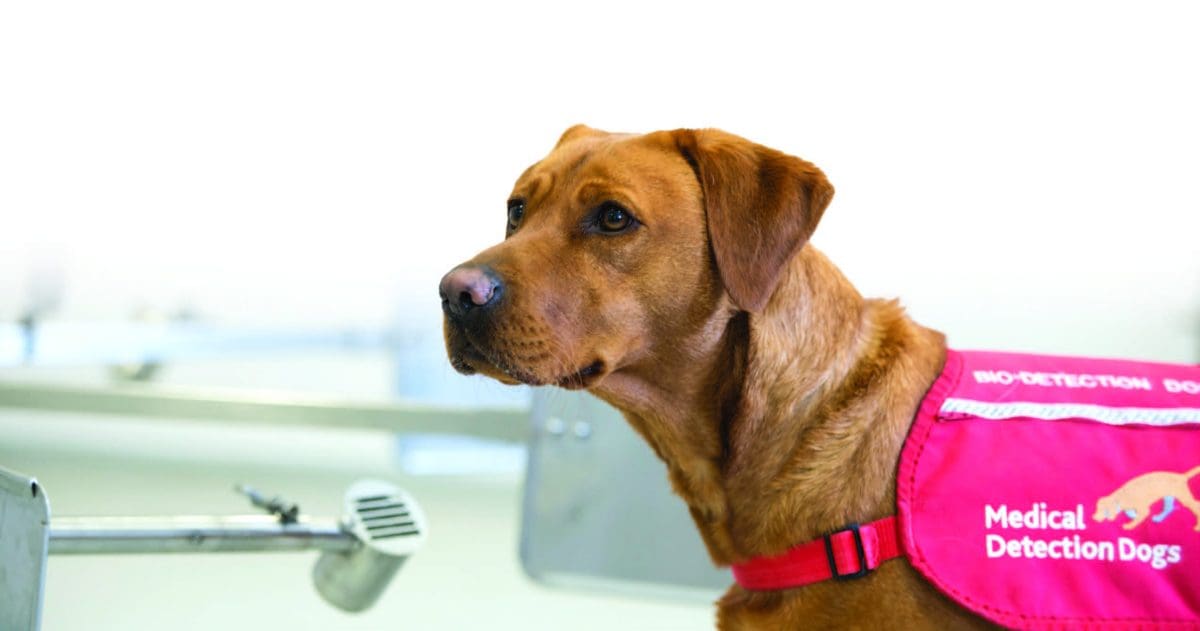There’s a workplace with a difference in Milton Keynes, where suits and ties are replaced with harnesses, bright red jackets and smart collars and bags are packed with toys and biscuits. Colleagues have four legs and waggy tails and they spend their lunch breaks running, wrestling and sunbathing.
The ‘office’ is a state-of-the-art training facility belonging to the charity, Medical Detection Dogs, and the recruits are specially trained dogs who save lives using their amazing sense of smell.
There are two types of hairy heroes working for the charity. Medical Alert Assistance Dogs support individuals with complex health conditions such as Type 1 diabetes, POTS and non-epileptic seizures by alerting them to an impending life-threatening medical episode. They typically give them a five to ten-minute warning so they can take the necessary action and avoid injury, hospitalisation, embarrassment and drama. As well as saving their lives they restore them, by giving them back their confidence and independence.
Bio Detection Dogs are trained to accurately detect the odour of human diseases such as cancer, malaria and Parkinson’s from samples in the training room. This pioneering work could lead to dogs playing an important role in screening for diseases and improving patient care in hospitals. Beyond this, the charity’s vision is to help scientists and medics develop faster, cheaper and non-invasive methods of diagnosis that could impact on thousands of lives.
Dogs are the best biosensors on the planet. They have up to 300 million scent receptors in their noses, compared to a human’s five million, and are able to detect odour at parts per trillion. To put this into context, this is the equivalent of being able to smell a teaspoon of sugar in two Olympic-sized swimming pools.
For many of the charity’s clients, there is no technology available to aid them with their condition and they have no idea they are about to become dangerously unwell. But Medical Alert Assistance Dogs are able to quickly and reliably inform them that an episode is imminent, due to a change in their body odour.
The Bio Detection Dogs are also able to identify the odour of human disease with incredible levels of accuracy. In Phase 1 of a study to train dogs to detect the odour of COVID-19 for example, they could find an infected individual with up to 94% accuracy and were more reliable than most diagnostic tests available at the time. In another study, prostate cancer detection dogs’ noses were 71% sensitive – the rate at which the dogs correctly identified positive samples and 73% specific – the rate at which the dogs correctly ignored negative samples, including those with other diseases – when detecting Gleason 9 prostate cancer, the most aggressive kind. The dogs also correctly identified when 73% of patient samples did not have the disease. This compares favourably to the most commonly used prostate cancer test, the PSA blood test, and demonstrates how a new screening method based on a dog’s nose could support the PSA test and improve early diagnosis, leading to better health outcomes and saving lives.
The charity relies on the public’s generosity and goodwill and there are lots of ways to support this incredible work. Sponsoring a puppy costs from just £5 a month, including regular ‘pupdates’. Firms can nominate Medical Detection Dogs as their charity of the year, so all fundraising efforts contribute to training more dogs, while the corporate partnership scheme helps increase brand awareness, positive PR, and measurable commercial and marketing benefits to an organisation. Gifts can be left in a will, which will cost nothing to do, but will help the charity to achieve its goals in years to come. It is also possible to volunteer in all sorts of ways, including socialising a puppy through its early training.
To find out more, visit www.medicaldetectiondogs.org.uk or call 01296 655888.
With thanks to DFA Law for sponsoring these pages.













